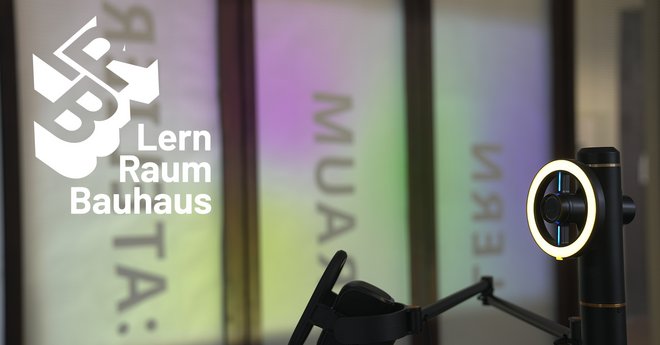
In the »Bauhaus Learning Space«, we want to identify ways in which hybrid learning spaces can be designed and used in the future at the Bauhaus University Weimar. To achieve this, we are collecting and testing technical pedagogical strategies for interdisciplinary use in all faculties and thus identify potential solutions to build our own prototypes and experiment with different teaching and learning scenarios. Our goal is to not only inspire and support, but to implement these strategies along with the ideas of students and faculties. Through this, we can offer ways to further advance future hybrid formats as comprehensively as possible at the Bauhaus University campus.
Furthermore, we are interested in mobile solutions that expand on the definition of "hybrid" to enable connections between different locations and to strengthen the contact with our local and international partners. The main objectives of the project will be achieved through a number of sub-projects.
The Hybrid Learning Studio
A space where we can test the practicality, usability and pedagogical potential of our prototypes. These serve as a starting point for transfer to other learning spaces at the university and for the constant further development of the concept of hybrid learning spaces.
The Studio Learning Space
An open meeting space for teachers and learners to produce a range of resources and materials. Our goal is to develop a platform for the exchange of best practice solutions in the form of a makerspace for learning technologies, methods and applications.
Learning with Objects
A concept which supports ten individual projects that integrate 3D objects into virtual and hybrid learning environments in order to experiment between real and virtual space. In addition to the transformation between these two spheres, many connecting points are also created to explore the different disciplines within Bauhaus University Weimar.
Pilot Projects
In the future, we envissage the knowledge acquisition and the development of competencies in virtual learning spaces to be much better than before. With a focus on accessibility, cooperation and interactivity, this is being advanced with various pilot projects in order to implement solutions for the entire university.
Virtual excursion: 360° models used as virtual excursions can lead to sustainable learning experiences. Starting from the application area of environmental engineering, the use of these models as virtual excursions are tested and extended to other application areas. Questions concerning the support of students in the selection from available excursions, embedding them into teaching and learning scenarios as well as learning objective control and performance recognition have to be clarified. The first freely available 360° models are available at www.360-degree.education Further information on this pilot project can be found >>> here
Urban Design Hackathon: The Urban Design Hackathon is a 24-hour online workshop for international students from several European universities. In mixed teams, students develop ideas for sustainable urban design. It provides a unique opportunity for collaborative learning and design using a variety of digital tools and is a case study for online collaboration that can be extended to other application areas. >>> to the website
